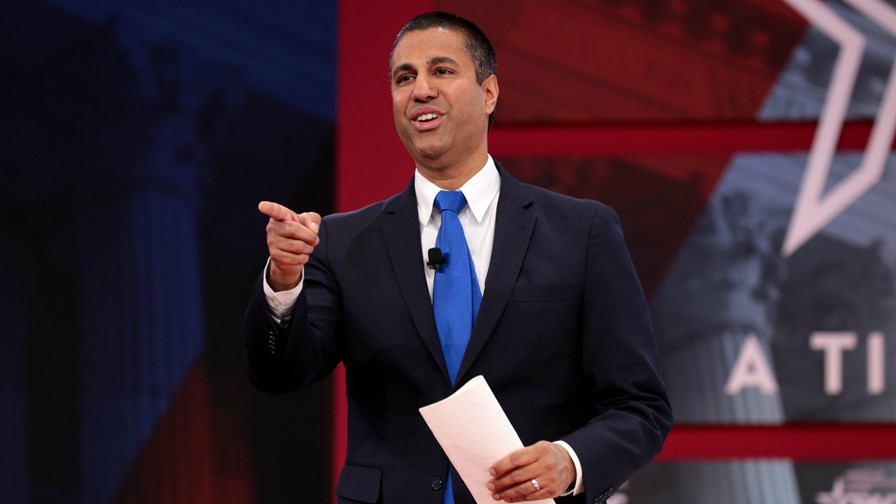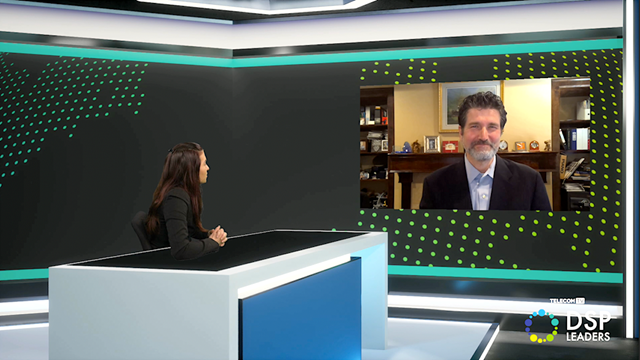
FCC Chairman Ajit Pai via Flickr © Gage Skidmore (CC BY-SA 2.0)
- Chairman says FCC has no power to impose net neutrality regulations...
- … But does have the power to stop individual states from introducing their own
- "Broadband is not a telecommunications service" he says
- Time to invoke the 10th Amendment?
Yesterday, yet another blatant example of the the dark art of ventriloquial doublespeak was evinced by the American ISP's favourite sock puppet, Ajit Pai, the chairman of the Federal Communications Commission (FCC). Pai was outlining to the the US Court of Appeals in Washington DC the regulator's defence of its repeal of the net neutrality regulations that were enacted during the time of the Obama presidency.
He told the court that broadband "is not a telecommunications service" as defined by earlier federal laws , but is instead an "information service" and, as such, cannot be subject to "common carrier" controls such as net neutrality.
Thus, according to the chairman's convoluted argument (to call it 'logic' would be to overgild an already blowsy lily) the FCC simply does not have the legal authority to maintain and enforce net neutrality because it is only empowered to impose common carrier regulations on telecommunications services. Pai added, "Given these classification decisions, the Commission determined that the Communications Act does not endow it with legal authority to retain the former conduct rules."
The FCC is in the Court of Appeals to defend itself and its actions in repealing net neutrality regulations (passed 3 -2 on partizan party political lines) against a lawsuit filed by the attorneys general of 22 US states and the District of Colombia demanding that the status quo ante by reimposed and net neutrality be reinstated.
It should be remembered that in 2016 the Washington DC appeals court decided that the Obama-era net neutrality rules were indeed legal and kept them on the statute books despite the concerted efforts of the nation's powerful ISPs and broadband providers to have them struck down.
Later, the by now Republican-dominated FCC board went ahead and repealed net neutrality anyway, Now, in this latest twist, Ajit Pai is claiming that not only were the Obama-era regulations wrong in thought, deed and implementation, but that the FCC actually has no authority to impose any net neutrality regulations at all.
Quite how Pai can now square the circle and continue to claim to have the power to prevent individual state legislatures from enacting their own net neutrality laws remains to be seen, but the master of corkscrew thinking will no doubt come up with something tortuously circumvoluted when the Appeals case opens properly in February next year. However, by then the November US mid-term elections will be history and the political landscape may look a bit different.
Time to go back to the Founding Fathers?
The state attorneys general and other parties to the suit against the FCC, including many consumer rights and consumer protection groups and a range of telecoms technology companies, argue that, by definition, broadband is telecommunications.
Their case is that ISPs and broadband providers "simply transmit information between users. None of Comcast, AT&T or Verizon adds scenes to the movies we watch online or embellishes our friends' notes on a social media 'wall.' Broadband is a transmission conduit; its nature is unchanged by the fact that it intentionally allows reaching others' information services."
In essence the problem with the Board of the FCC is that they are political appointees with a political agenda. They are not elected and not accountable but have untrammelled authority to impose regulations that accord with the political bent of the current administration (of whatever stripe) at any particular time.
So, according to Republican appointee Pai, the FCC has no power to impose net neutrality but does have the power to prevent the elected legislatures of individual states from passing their own net neutrality rules.
Now, far be it from me, a Brit, to pretend to be any sort of authority on the US Constitution, but having been a very frequent visitor to America for over 35 years now and having been a keen student of US history for longer than that, is it not the case that if Pai's FCC abrogates its responsibilities and remit by claiming that federal law prevents it from regulating broadband surely matters then fall under the terms of the Tenth Amendment to the Constitution of the United States?
The Tenth Amendment defines the principle of federalism and states' rights and states that the federal government has only those powers delegated to it by the United States Constitution. It adds, "All remaining powers are reserved for the states or the people."
Surely then, those states that are pursuing the introduction of their own net neutrality legislation are legally entitled and empowered to do so. In other words, Mr Pai, you cant have your cake an eat it too.
The sort of doublethink, doublespeak, doubledealing now emanating from the FCC echoes events in George Orwell's dystopian novel '1984'. I am irresistibly reminded of the section in the book where, whilst deep into a ranting polemic diatribe about the vile enemy "Eurasia" and the virtues of friendly power "Eastasia" the orator involved is handed a new script and, mid-sentence, changes the name of the enemy to "Eastasia" and extols "Eurasia" as a firm long-time ally.
There is a plus side though. We can look forward to the day when Mr. Pai, at last relieved of the burdens of high office and free to do his own thing, sets up a business moving the goalposts on every football field in America. He's got the experience and the drive and the gall.
Email Newsletters
Sign up to receive TelecomTV's top news and videos, plus exclusive subscriber-only content direct to your inbox.




